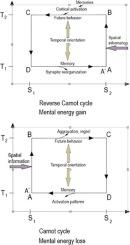Computational and Structural Biotechnology Journal ( IF 6 ) Pub Date : 2021-01-12 , DOI: 10.1016/j.csbj.2021.01.008 Eva Deli 1 , James Peters 2, 3 , Zoltán Kisvárday 4

|
There is a general expectation that the laws of classical physics must apply to biology, particularly the neural system. The evoked cycle represents the brain's energy/information exchange with the physical environment through stimulus. Therefore, the thermodynamics of emotions might elucidate the neurological origin of intellectual evolution, and explain the psychological and health consequences of positive and negative emotional states based on their energy profiles. We utilized the Carnot cycle and Landauer's principle to analyze the energetic consequences of the brain's resting and evoked states during and after various cognitive states. Namely, positive emotional states can be represented by the reversed Carnot cycle, whereas negative emotional reactions trigger the Carnot cycle. The two conditions have contrasting energetic and entropic aftereffects with consequences for mental energy. The mathematics of the Carnot and reversed Carnot cycles, which can explain recent findings in human psychology, might be constructive in the scientific endeavor in turning psychology into hard science.
中文翻译:

认知的热力学:数学处理
人们普遍期望经典物理定律必须适用于生物学,特别是神经系统。诱发循环代表大脑通过刺激与物理环境进行的能量/信息交换。因此,情绪的热力学可能会阐明智力进化的神经学起源,并根据积极和消极情绪状态的能量分布来解释其心理和健康后果。我们利用卡诺循环和兰道尔原理来分析各种认知状态期间和之后大脑静息和诱发状态的能量后果。也就是说,积极的情绪状态可以用逆卡诺循环来表示,而消极的情绪反应则触发卡诺循环。这两种情况具有截然不同的能量和熵后效应,并对精神能量产生影响。卡诺和逆卡诺循环的数学可以解释人类心理学的最新发现,可能对将心理学转变为硬科学的科学努力具有建设性。


























 京公网安备 11010802027423号
京公网安备 11010802027423号